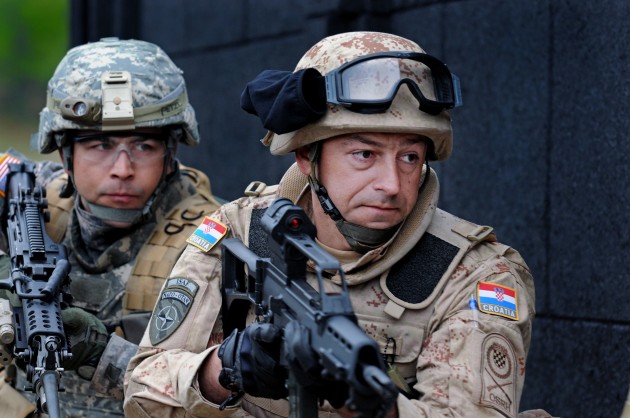No More NOFORN: Hill Needs To Help Troops Work With Allies
Posted on

A Croatian soldier and a Minnesota National Guardsman train together for Afghanistan.
[UPDATED] ARMY WAR COLLEGE: When the Army invited NATO officers here to discuss the “deep future” of warfare in the 2030s, the organizers ran up against a present-day problem. Current regulations forbade them from showing certain information to their allies. It was just the latest case of a chronic problem which has hindered coalition operations around the world, but which is so deep-rooted it may require congressional legislation to fix.
The material was not classified. In fact, the Army’s Training And Doctrine Command (TRADOC) had taken care to keep the entire wargame and the associated senior-officer conference unclassified, in large part to make it easier for foreigners to participate and to provide a non-US perspective on common problems. But it is entirely possible for an unclassified document to be stamped NOFORN. What’s it mean? “No foreign nationals” may see the document or learn the information.
In this case, someone — I wasn’t told exactly who — decided a particular graphic on a particular page of a particular background paper was too revealing and couldn’t be shown to officers from America’s closest allies, including Australia, Britain, France and Germany. Many of these officers have extensive experience fighting alongside Americans in Afghanistan or Iraq. With no time to appeal the decision before their guests arrived, the organizers reluctantly handed their foreign guests a redacted version. Ironically, I — a reporter, with no security clearances of any kind — was issued the full version, and I can assure you the graphic in question appears completely innocuous.
It was an example in miniature of a major problem. Such petty, arbitrary restrictions drive some Americans crazy.
“It’s embarrassing what we can’t share,” said one American general who hosts many foreign officers on his base. The Army needs “to completely relook its foreign-disclosure process, because at any point anybody can say ‘no,’ and most of it’s baloney.”
“That NOFORN thing…really chaps my hide,” agreed another American general. “Most of the time, when we tell folks you don’t need to know that and you can’t have it, it’s in Google.”
The restrictions are more than an annoyance. One participant said that the four Mideastern nations that have bought American Patriot missiles don’t have the information needed to coordinate their batteries effectively against a common threat (e.g. Syria or Iran), or even to work well with the US Patriot units in the region. Another said his efforts to collaborate on new technology were hobbled by his inability to share even basic data. In military operations, several participants said, the restrictions can undermine hard-won mutual trust, slow the flow of vital information to decisionmakers, and even keep some options off the table entirely.
“It doesn’t stop a coalition,” said one allied officer. “It just stifles the use of some capabilities within it.”
The problem goes deeper than institutional culture or even military regulations: Some of the restrictions are written into law. There are some waivers and workarounds. And, of course, Americans sometimes ignore the rules with a wink and a nod — and then have to lie about it to any Foreign Disclosure Officer (FDO) who might come calling. But a fundamental fix would require Congress to act.
“We’re going to need legislative champions for this,” said one American general thoughtfully, “a Skelton-esque kind of legislative champion.” (Missouri Rep. Ike Skelton was the top Democrat on the House Armed Services Committee for years and was renowned for his hard work on unglamorous issues like professional education for military officers).
“We all look at information like a treasure which has to be protected against others,” said one foreign general. To the contrary, he said: “It is a currency that has to be invested in order to be productive. It has to be invested in your partners.”
“We have too much ‘need to know,'” the general said. “We should come to ‘a duty to share.'”
[Updated 5:50 pm 19 September: In this one small case, at least, sanity prevailed: On Thursday, organizers got permission to give the allies the unredacted slide.]
Subscribe to our newsletter
Promotions, new products and sales. Directly to your inbox.
